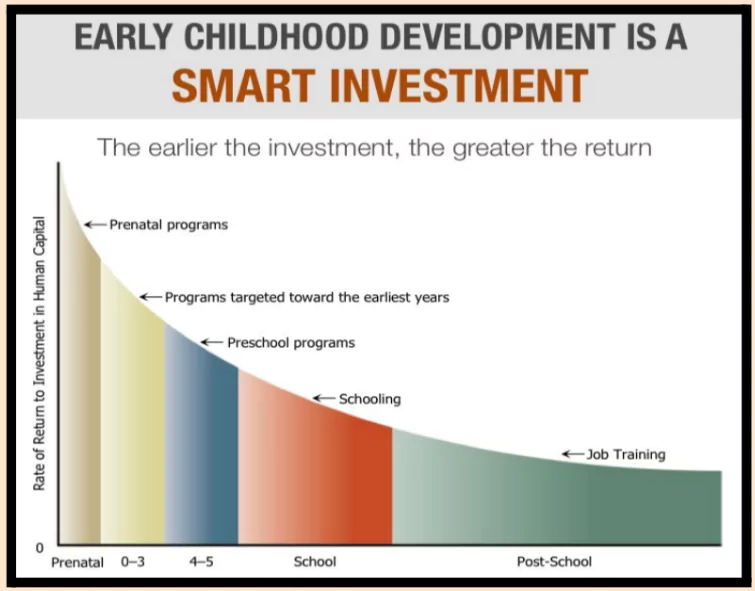The circumstances a child is born into shapes their health, nutrition, learning, and earning potential, perpetuating a cycle of inequality. However, strategic Early Childhood Care and Education (ECCE) can break this cycle by ensuring all children get an equal start.
About Early Childhood Care and Education (ECCE)
- ECCE refers to the holistic development of children from birth to eight years, encompassing health, nutrition, early learning, and psychosocial well-being.
Pioneer Educators Behind ECCE In India
India’s ECCE movement can be credited to Dr. Tarabai Modak and Gijubhai Badheka, two stalwarts who revolutionized early education.
- Contributions of Dr. Tarabai Modak:
- Balwadi Movement: Introduced community-based preschools for rural children.
- Montessori Adaptation: Modified Montessori methods to suit Indian socio-cultural contexts.
- Contributions Of Gijubhai Badheka
- Child-Centric Schooling: Founded Dakshinamurti Bal Mandir in 1922 for promoting joyful learning.
Educational Literature: Wrote extensively, including Divaswapna, advocating playful, meaningful education.
|
Components of ECCE
- Health: Regular health check-ups, immunization, and hygiene practices to ensure physical well-being.
- Nutrition: Adequate and balanced nutrition to support growth and brain development.
- The NFHS-5 found that only 11.3% of children below 2 years received an adequate diet.
- Early Learning: Age-appropriate, play-based learning to foster curiosity and cognitive skills.
- Example: National Curriculum Framework for Foundational Stage (NCF-FS) emphasizes experiential learning.
- Psychosocial Care: Safe, nurturing environments that support emotional and social development.
- Example: Under the Integrated Child Development Services (ICDS), Anganwadi Centres provide not just nutrition and early learning, but also psychosocial care.
- According to government data as of 31st December 2023, there were 13,48,135 Anganwadi workers and 10,23,068 Anganwadi helpers in the country
- Parental Involvement: Active engagement of parents and caregivers in a child’s early development.
- Example: Involvement of ASHA (Accredited Social Health Activists) workers in parental education.
Early Childhood Care and Education (ECCE) & SDGs: ECCE is Integral to achieving the following SDG’s:
- Sustainable Development Goal (SDG) 4.2: To ensure access to quality early childhood development and pre-primary education.
- SDG 1 (No Poverty): Quality ECCE helps break the cycle of poverty by giving disadvantaged children a better start in life.
- SDG 3 (Good Health and Well-being): ECCE promotes physical, emotional, and cognitive development through integrated health, nutrition, and education interventions.
- SDG 10 (Reduced Inequalities): ECCE ensures that marginalized children, including those with disabilities or in remote areas, get equal opportunities.
|
Significance of ECCE
- Cognitive and Brain Development: 90% of brain growth happens by age five, making early stimulation vital for cognitive development.
- Social Development: ECCE builds social skills, emotional regulation, and school readiness, reducing behavioral issues.
- Economic Benefits: Investing in ECCE leads to better education, employment, and social outcomes, with the highest economic returns as per the Heckman Curve.
Heckman Curve

- The Heckman Curve shows that the highest rate of economic returns comes from the earliest investments in children.
- Society invests too much money in later development when it is often too late to provide great value.
- Findings Of Heckman: As per Heckman, every dollar invested in early childhood education yields a return that ranges from $7 to $12
- Children with quality early education are 4x more likely to earn more and 3x more likely to own a home.
- By age 5, key gaps in earning potential and life outcomes are already visible.
|
Challenges in India’s Early Childhood Education (ECE) Landscape
- Inadequate Instructional Time: Over 5.5 crore children (ages 3–6) are enrolled in 14 lakh Anganwadis and 56,000 government pre-primary schools.
- Anganwadi workers spend only 38 minutes/day on preschool instruction (well below the recommended 2 hours).
- Inadequate Availability Of Resources: Only 9% of pre-primary schools have a dedicated ECE teacher.
- One supervisor is responsible for every 282 Anganwadis, affecting quality monitoring.
- Poor Foundational Learning Outcomes: As per the India Early Childhood Education Impact Study, only 15% of children could match basic objects (key for literacy), and just 30% could identify larger and smaller numbers (essential for arithmetic).
- Gaps in Enrolment: Only 2% of 3-year-olds, 5.1% of 4-year-olds.
- Nearly 25% of 5-year-olds are enrolled directly in Class one, starting school without age-appropriate skills.
- Low public expenditure: Government spends only ₹1,263 per child on ECE, compared to ₹37,000 on school education.
- Limited Parental Awareness & Engagement: Most parents care but lack awareness and tools to support home-based learning.
- Funding Constraints: Inadequate budget allocation for ECCE (only ~3% of education spending).
Global Initiatives For ECCE
- UNESCO’s Global Partnership Strategy for ECCE (2021-2030): Focuses on inclusive and equitable education.
- UNICEF’s Early Childhood Development (ECD) Programme: Promotes nurturing care through health, nutrition, early learning, and protection, especially for disadvantaged children.
- World Bank’s Early Learning Partnership (ELP): Provides technical and financial support to improve early learning outcomes in low- and middle-income countries.
- Tashkent Declaration For ECCE: It was adopted at the World Conference on ECCE in Tashkent, Uzbekistan, in November 2022.
- It aims to strengthen, expand, and transform ECCE systems around the world to ensure every child gets the best start in life.
|
Initiatives In India For The Development Of ECCE
- National Education Policy (NEP) 2020: Recommends universal access to ECCE by 2030.
- Introduces a 5+3+3+4 curricular structure, integrating ECCE into formal schooling.
- NEP recognizes ages 3–8 as the Foundational Stage and advocates for universal, play-based, and holistic early education to ensure lifelong learning and development.
- Integrated Child Development Services (ICDS): Provides Anganwadi-based ECCE, nutrition, and health services.
- Jaduipedi Kits: Jaadui Pitara, meaning “magic box,” is an NCF-FS-aligned ECCE kit with toys, puzzles, storybooks, and teaching aids designed for joyful, activity-based, and age-appropriate learning.
- States are customizing it to reflect local languages and cultures.
Key Recommendations from the Global Report on ECCE (Early Childhood Care and Education):
- Promote School Readiness: Focus on foundational skills like literacy, numeracy, and social-emotional development to better educational outcomes.
- Prioritize Vulnerable Children: Ensure access to quality ECCE for disadvantaged groups.
- Support Parents and Caregivers: Governments must take a whole-of-society approach and include parental support programmes and family-friendly policies to improve children’s early learning experiences.
- Value ECCE Personnel: Invest in recruitment and professional development of ECCE personnel to have the skill sets for creating safe, healthy, and stimulating early learning environments..
- Invest in Data: The international community must develop new indicators and mechanisms to better support and monitor the development of the ECCE sector, particularly for children younger than 3.
|
- e-Jaadui Pitara: The Ministry of Education has launched the e-Jaadui Pitara to complement the physical box and democratise access through multiple channels: Computers, smart- and feature-phones, television and radio.
- Initiatives Of States:
- Uttar Pradesh is hiring nearly 11,000 ECCE educators for Balavatikas in all districts.
- The State has also organised a six-day residential training programme for 50 master trainers from 13 districts to train them on ECE pedagogy.
- Balvatikas are pre-primary classes for ages 3–6 introduced in schools under the National Education Policy, 2020 to ensure foundational learning through play-based education.
- Odisha is opening Shishu Vatikas in all government schools to make children in the age group five to six school ready.
- Shishu Vatikas are early learning centres at Anganwadis to support holistic development of young children, especially in rural and underserved areas.
- Madhya Pradesh’s Bal Choupal: These are monthly community events to promote play-based learning.
Way Forward
- Leveraging Anganwadi: The government programmes such as Mahatma Gandhi National Rural Employment Guarantee Scheme (MGNREGS) and National Rural Livelihood Mission (NRLM) can be leveraged in upgrading the anganwadi system.
- Expanding Public-Private Partnerships (PPP): Promote scalable and innovative ECCE models through partnerships with private players, civil society, and philanthropic organisations.
- Enhancing Quality and Training: Standardize ECCE curriculum and establish dedicated institutions like the proposed National Institute of Early Childhood Education to ensure quality educator preparation.
- Leveraging Digital Tools: Utilize platforms like the DIKSHA portal to upskill Anganwadi workers and pre-primary educators through accessible digital content and training modules.
- Community Mobilization and Awareness: Implement parental education initiatives through Self-Help Groups (SHGs) and local NGOs to promote early learning practices at home.
- Parental engagement can be further strengthened through WhatsApp or EdTech apps.
- Decentralised Monitoring and Support: Empower Gram Panchayats to oversee and support ECCE centres for improved accountability and localised problem-solving.
Conclusion
Investing in ECCE and parental engagement is key to unlocking every child’s potential, breaking intergenerational disadvantage and human capital development.
- It lays the foundation for India to emerge as a global leader by 2047 and realising India’s vision of becoming a true Vishwa Guru.
![]() 30 May 2025
30 May 2025

